Last Monday I shared reviews of some of the lighter books I’ve read in recent weeks. The slightly more serious books in today’s post were more in line with my usual taste, and all five were well worth the read. Enjoy the reviews!
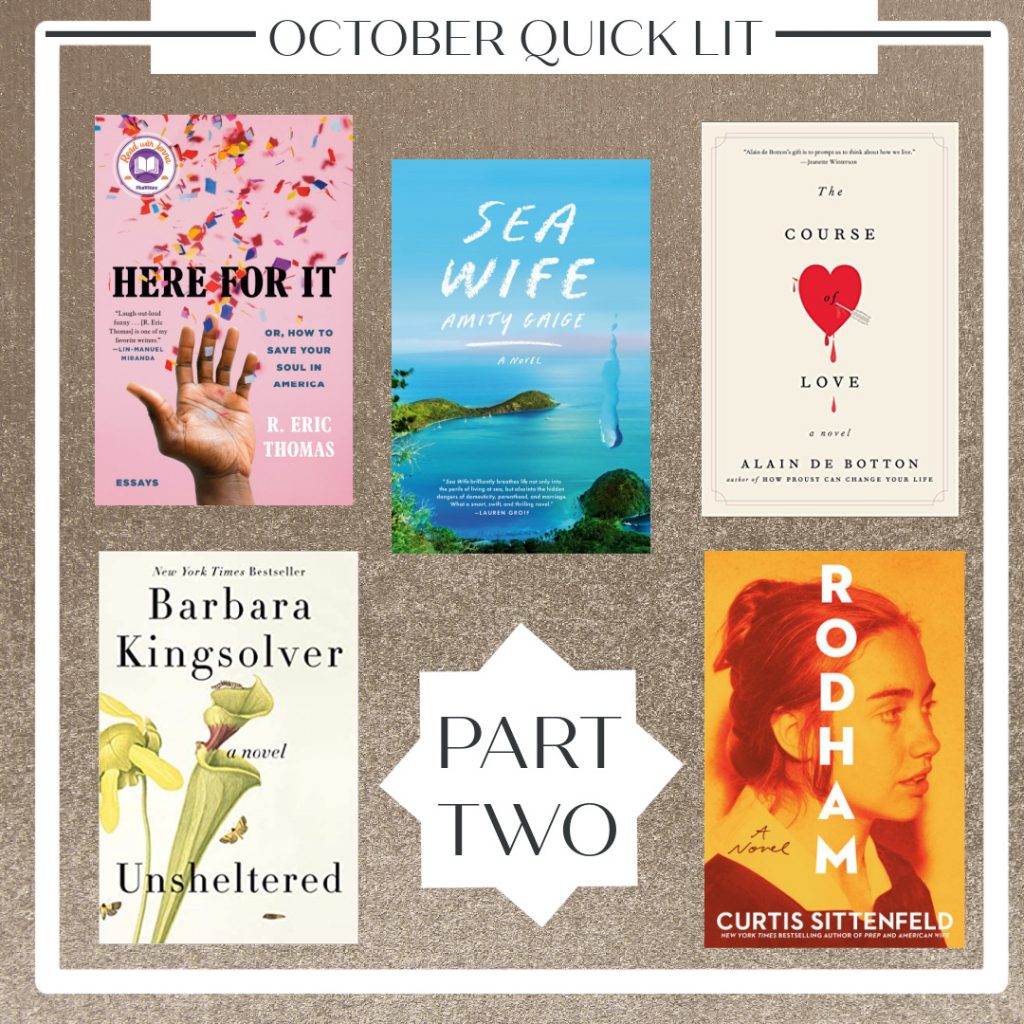
The Course of Love, by Alain de Botton: Most popular love stories explore the beginnings of a relationship, leaving off with a lovestruck couple whose implied “happily ever after” inevitably winds up on the cutting room floor. But as Alain de Botton observes, “What we typically call love is only the start of love.” There is so much more to a love story—to a relationship—than a flashy Meet-Cute. In The Course of Love, we follow one ordinary couple past those early stages of their relationship to explore something much deeper.
Rabih and Kirsten are an Edinburgh couple with a cookie-cutter relationship. We know from the start of the book that, following a fairly uneventful courtship, Rabih and Kirsten “will marry, they will suffer, they will frequently worry about money, they will have a girl first, then a boy, one of them will have an affair, there will be passages of boredom, they’ll sometimes want to murder one another and on a few occasions to kill themselves. This will be the real love story.” These are the basics. But as with every marriage, the intimate details are where the real story can be found.
Interwoven throughout Rabih and Kirsten’s story are philosophical and psychological commentaries that lift us out of the narrative and bring insight and application to the nuances of their marriage. The result is novel that reads like a mashup between a fable and a sociology textbook, and while that description might seem dull, the book itself is anything but. Kristen and Rabih’s relationship is far from extraordinary, and therein lies the appeal: this average couple’s experiences are so relatable that I couldn’t turn the pages fast enough, so eager was I to find out what would happen to this “couple next door.”
While the story itself is engaging, it’s the annotations that I found most intriguing of all. De Botton offers fascinating observations on romance, parenthood, cognition, and behavior; some of his conclusions were not in sync with my personal beliefs, but nearly all of his commentaries were intriguing, and many provided keen insight into my own psyche and relationships. Reading about the dynamic between Kirsten and Rabih helped me to gain a deeper understanding of my marriage to Luke, and I would love to reread this book alongside him.
This book contains some graphic sexual scenes that I could have done without, and as I mentioned above, I didn’t always agree with De Botton’s conclusions (especially those regarding sexuality, intimacy, and fidelity). Even with those caveats, this is one of the most memorable and insightful books I’ve read in quite some time. I appreciated the chance to read about a realistic, deeply flawed couple who are willing to put in the hard work of preserving their relationship. Our world could use more stories like these.
My Rating: 4.5 Stars. (Rounded up to 5 stars on Goodreads.)
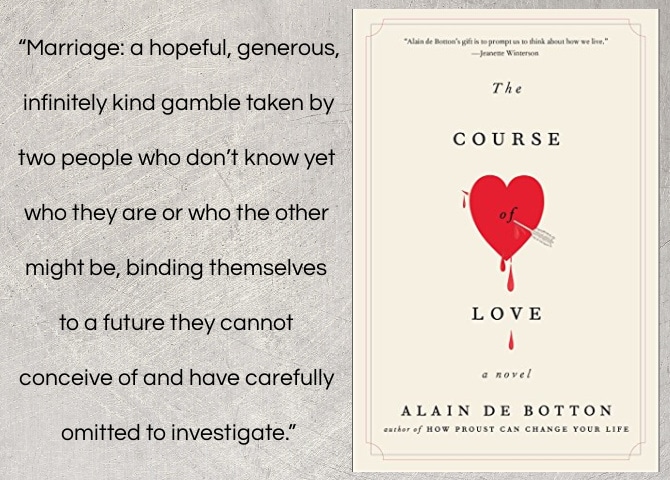
Sea Wife, by Amity Gaige: Disillusioned with life and struggling in their marriage, Juliet and Michael decide to leave it all behind. Though they are novice sailors, Michael convinces Juliet to embark on a year-long sailing venture aboard a forty-four-foot sailboat christened the Juliet. The couple, along with their two young children, face challenges and adventures on a journey that ultimately ends in catastrophe.
Sea Wife is told from two alternating perspectives: Juliet’s first-person narration, shared after returning from the journey, and Michael’s captain’s log that provides a real-time account of the family’s time at sea. The narratives blend seamlessly to form a picture of not just their adventure, but also their troubled marriage and inner turmoils.
Sea Wife lives up to its description as a “smart, sophisticated literary page turner,” and although it wasn’t quite the thriller I was expecting, I found the story riveting, with details of the story revealed at just the right pace to keep me intrigued. The writing is beautifully poetic, and while I struggled at times with the complex narrative style—which was occasionally difficult to follow—I found the dichotomy between Juliet’s lyrical reflections and Michael’s matter-of-fact documentations quite effective for conveying the realities of their personalities and their relationship. I deeply appreciated the thoughtful and insightful exploration of many difficult themes including trauma, depression, political ideologies, and unfulfilled dreams. Juliet and Michael are rather unlikeable characters, but their flaws serve to bring them to life and make their marital woes feel both believable and relatable.
My Rating: 3.5 Stars (Rounded down to 3 stars on Goodreads.)
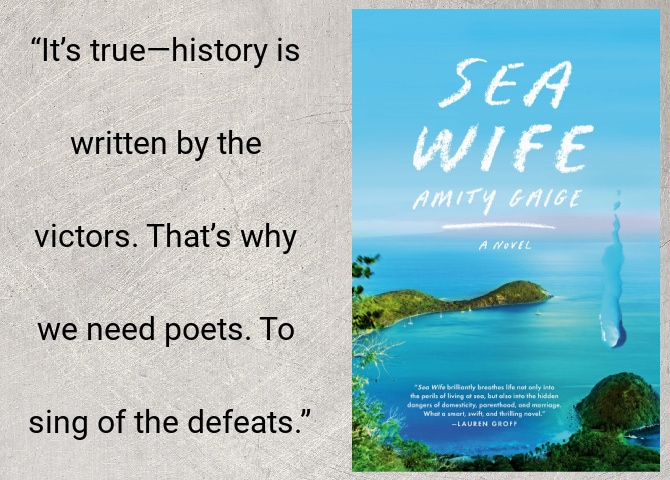
Unsheltered, by Barbara Kingsolver: After a lifetime spent responsibly pursuing the American Dream, Willa Knox and her family have stumbled into a patch of bad luck. The magazine where Willa worked has folded and the college where her husband had tenure has closed, forcing the couple to move into an inherited brick home in Vineland, New Jersey, along with Willa’s ailing father-in-law and her two adult children—the free-spirited Tig and straight-laced Zeke, who has arrived with his unplanned newborn son. With their home crumbling around them, Willa begins researching the house’s history, desperately hoping that a historical society might provide funding for the home’s repairs. Her research leads her to the discovery of Thatcher Green, who resided in her home in the 1800s.
Thatcher is a science professor whose interest in the recently published ideas of Charles Darwin is unpopular with his employer. Much to the embarrassment of Thatcher’s young wife and her mother, his unconventional ideas make waves in their conservative community. Grappling with financial woes, a structurally unsound house, and growing animosity within his family and workplace, Thatcher finds a kindred spirit in his neighbor, a brilliant woman scientist named Mary Treat.
This was my book club’s September selection, and not a book I otherwise would have chosen: I read Kingsolver’s The Poisonwood Bible in college, but her books haven’t been on my radar in recent years. This is a challenging book for me to review: on one hand, I found Kingsolver’s prose exquisite, building big ideas, vivid characters, and clever wordplay into engaging storylines. I especially enjoyed the juxtaposition of past and present characters grappling with similar issues—most notably, the discomfort that comes from leaving the shelter of conventional systems and beliefs—even if I found some of the parallels and connections to be a stretch. And while the story was a slow start for me, and I didn’t care for the inconclusive ending, I was deeply invested during the middle sections.
The uneven pacing was frustrating, but where the novel really lost me was in the heavy-handedness of its themes. Many of the scenes stray deeply into lecture territory, and Kingsolver’s ideas on religion, capitalism, democracy, and personal responsibility would have been easier to accept—or at least appreciate—had they been presented with more subtlety and nuance.
I was looking forward to our book club discussion, as the novel provides plenty of conversation points; unfortunately, the novel’s slow start prevented the other book club members from finishing the book. Like me, they found this to be well-written but that it ranked low on the enjoyability scale.
My Rating: 3.5 Stars. (Rounded down to 3 stars on Goodreads.)
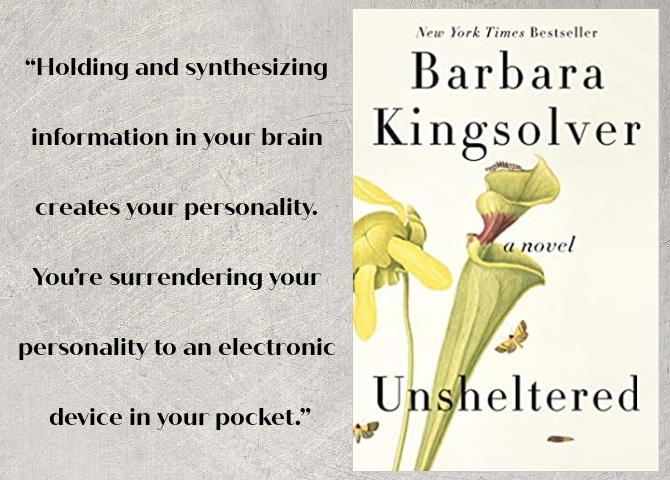
Rodham, by Curtis Sittenfeld: This realistically imagined work of speculative fiction asks the question: what would have happened if Hillary Rodham had never married Bill Clinton? The alternative biography introduces Hillary in 1971, when the aspiring lawyer meets fellow student Bill Clinton while attending Yale Law. She is smitten with the charismatic southerner and follows him back to Arkansas. But instead of accepting his marriage proposal, Hillary breaks off the relationship and goes on to blaze her own trail in the political world. What unfolds is a life in many ways similar to the actual life led by Hillary Clinton, and in other ways extraordinarily different. Sittenfeld adroitly (and sometimes humorously) weaves historical figures and events into the narrative, crafting a compelling read that is part political commentary, part character study, and part exploration of the intersection of gender, politics, and power. Though theme-heavy, Rodham is compulsively readable with snappy dialogue, a unique plot structure, and several unexpected story twists.
I am not a Hillary Clinton fan and wasn’t sure what my ambivalence towards her as a politician and my lack of knowledge about her (actual) life would mean for my appreciation of this novel. While a more thorough grasp of her biography might have enhanced my reading of Rodham, I still enjoyed this book quite a bit. Sittenfeld impressed me with her ability to craft such a believable alternate history, and I was fascinated by her speculations (particularly her imagined presidential lineup—quite different from the presidents who actually held office in the last three decades), and her ideas had me contemplating the ways that inconsequential relational ties can hold massive implications for an entire nation.
This book has the potential to make many people very angry: a number of key individuals—most notably Bill Clinton—are portrayed in a VERY negative light. On the other end of the spectrum, this book might feel like therapy for those who wanted a different outcome in the 2016 election. (I’m sure it was quite intentional on Sittenfeld’s part that this version of Hillary Rodham is excessively easy to root for.) I didn’t mind this bias and found that it made for a more intriguing (albeit less realistic) story. However, one aspect of the book that I REALLY didn’t care for was the detailed depiction of Hillary and Bill’s romantic relationship: I’m a bit of a prude when it comes to steamy literature, and it was particularly uncomfortable to read speculative bedroom scenarios between two real-life individuals.
In light of our current political climate, I’m not sure how well this book will age. I’m glad I read it when I did—if for no other reason than to take my mind off of the craziness that is the 2020 election.
My Rating: 4 Stars.
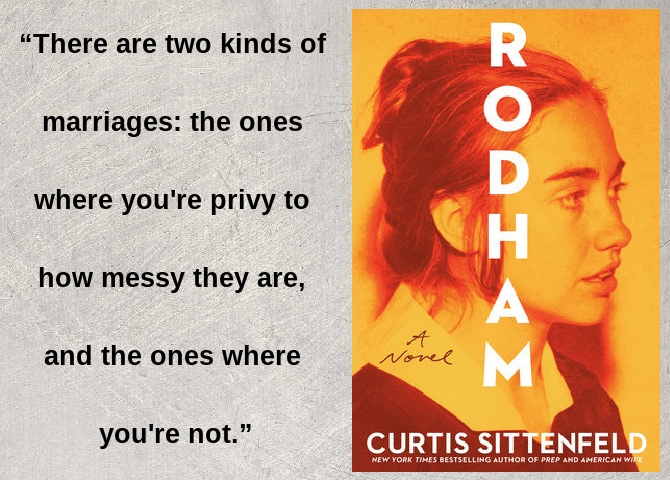
Here for It, Or, How to Save Your Soul in America, by R. Eric Thomas: Black, gay, and Christian, R. Eric Thomas grew up feeling like an outsider—first in his rich white high school and his conservative black church, and later at his Ivy League college. In this hilarious collection of essays, Thomas revisits his childhood, adolescence, and young adulthood, examining his lifelong struggle to reconcile disparate aspects of his identity. Thomas’s essays tap into his turbulent journey of coming to terms with his sexuality in college, to accidentally making a name for himself on the internet, to facing his position as a black man in America. He grapples with difficult issues of identity, hopelessness, and purpose while making sense of what it means for him to show up for his life.
A recap of this essay collection makes it sound like a downer, but let me reassure you that this is not a depressing read; in fact, it is one of the most uproariously funny things I’ve read in a while. Thomas’s unique brand of humor (flamboyant meets black sass, topped with ALL the pop culture references) is clever and timely, bringing hope and levity into poignantly heartfelt moments.
I loved listening to this book (I would definitely recommend the audio version, read by the author), which I found both entertaining and enlightening. I do wish that the book contained more memoir—by the end, I still didn’t quite feel that I know the true R. Eric Thomas beyond the candid-but-not-entirely-vulnerable image of himself that he chose to present. I would like to have learned more about Thomas and especially the glossed-over aspects of his personal and emotional transitions over the years. From what he chose to share, I was surprised by how much I was able to relate to this man who is ostensibly VERY different from me.
As with all essay collections, some are better than others, and the unevenness was occasionally quite jarring—almost as though the essays were written by entirely different people. But inconsistency aside, and even without the less personal bits I desired, this was a delightful read and a nice break from some of the heavier books I’d been reading lately.
My Rating: 4 Stars.
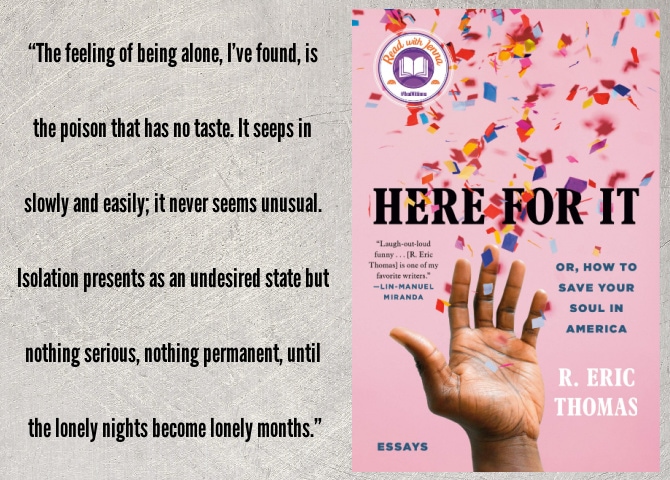
I’m linking up with Modern Mrs. Darcy to share what we’ve been reading lately. If you are here from the linkup, thanks for stopping by. You can check out Part One of this month’s book reviews right here.
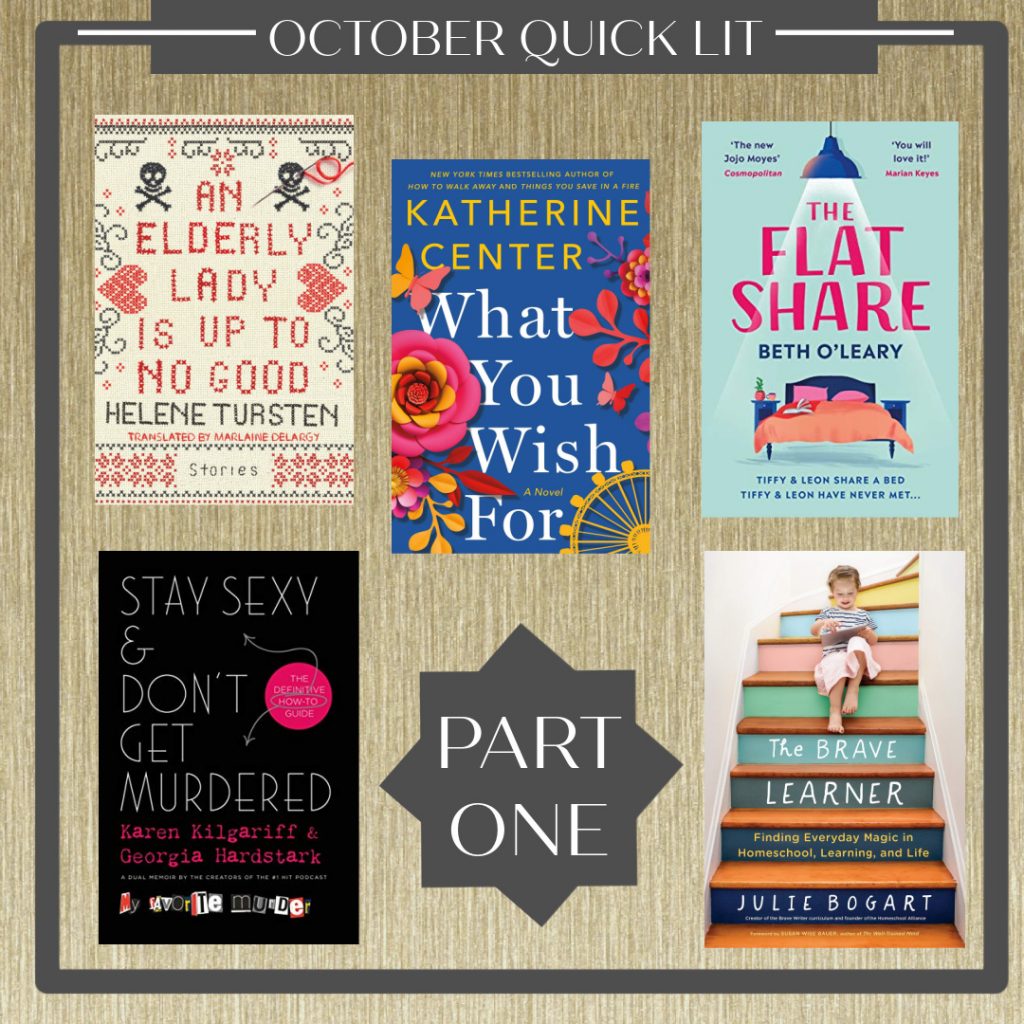
What is the best (or worst) book you have read lately? I’d love to hear about it!
You expressed my feelings toward Rodham so well. I enjoyed it, but I felt ‘icky’ with those fictional details of real peoples sex lives. I’m glad I read it but also not sure how long it will hold up.
I listened to Sea Wife on Libby. Seeing your thoughts on the changing styles, I think maybe having 3 narrators made it easier for me to move from her prose to his captain’s log.
Thanks for your lists! I already have The Flatshare on my TBR shelf and I’m thinking of downloading Here For It at your recommendation.
It’s always good to have some solidarity in my book views;
I hope you enjoy The Flatshare. I just finished The Switch last night and enjoyed it even more, the audio was great!
I am intrigued by Sea Wife’s description and just added it to my TBR! I enjoyed The Course of Love overall, but I agree with you that there were some of his thoughts on marriage and sexuality that I couldn’t stand behind, and actually were frustrating because they were so negative. I was a fresh newlywed when I read it 4-5 years ago, so that may be part of it, haha.
Here are my recent reads, if interested! https://elle-alice.blogspot.com/2020/10/september-book-reviews.html
Oh, I’m not sure if The Course of Love would have gone over well with me as a newlywed!
I hope you like Sea Wife. It’s such a unique and intriguing book!